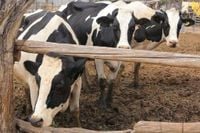The Secretary of Agriculture and Rural Development, Julio Berdegué, stated on Sunday, April 27, 2025, that Mexico will not "subordinate" itself to the United States' alert concerning the screwworm plague. This declaration comes in response to a letter from his U.S. counterpart, Brooke Rollins, who requested Mexico to allow the "full deployment" of USDA contractor planes for combating the insect on Mexican soil.
In his social media post, Berdegué emphasized, "As our president, Claudia Sheinbaum, has said, we act with a cool head; we collaborate, cooperate, but we never subordinate ourselves." He did not disclose the details of his response to Rollins but expressed confidence in reaching favorable agreements.
The U.S. had previously paused the import of Mexican livestock in November 2024 and reactivated it in February 2025 due to the detection of the screwworm, particularly along the border with Central America. The situation escalated when a 77-year-old woman from Chiapas died two weeks prior from myiasis, a condition caused by the screwworm.
Rollins, in her letter, demanded that Mexico "eliminate restrictions on USDA aircraft and waive customs duties on eradication equipment." She warned that if these issues are not resolved by Wednesday, April 30, 2025, the USDA would restrict the import of animal products, including live cattle, bovine, and equine originating from or transported through Mexico, to protect the interests of the U.S. agricultural industry.
As the New World Screwworm outbreak continues to rise, Rollins stressed that the barriers imposed by Mexico critically impair the collective response to this urgent problem. In her statement shared on social media, she highlighted the need for immediate action: "Each delay in granting full operational authority and eliminating customs barriers undermines our collective ability to carry out this emergency response."
During the 2023-2024 cycle, Mexico's livestock exports surged by 37.8 percent, totaling 1.3 million heads, according to the National Service of Health, Safety and Quality Agroalimentary (Senasica). However, the current tensions are compounded by the 25 percent tariffs Mexico faces on exports of steel, aluminum, cars, canned beer, and other products outside the United States-Mexico-Canada Agreement (USMCA).
Amid these developments, Berdegué reiterated Mexico's commitment to collaborate with the United States in addressing the screwworm issue. He announced that concrete measures are being taken to combat the plague, which poses a significant threat to livestock and could lead to severe trade restrictions.
The urgency of the matter is underscored by the significant drop in U.S. imports from Mexico. In March 2025, the USDA reported importing only 24,000 heads of cattle from Mexico, a staggering 79 percent decrease from the 114,000 heads imported in the same month the previous year. This decline highlights the critical need for resolution to avoid further economic repercussions.
As the situation unfolds, both nations are navigating a complex web of agricultural trade and health concerns. The screwworm, scientifically known as Cochliomyia hominivorax, not only threatens livestock but also poses risks to wildlife and human health by infecting open wounds in living animals.
In conclusion, the ongoing dialogue between the U.S. and Mexico regarding the screwworm plague reflects broader issues of trade relations, agricultural health, and the urgent need for cooperative measures to safeguard both nations' agricultural industries.




